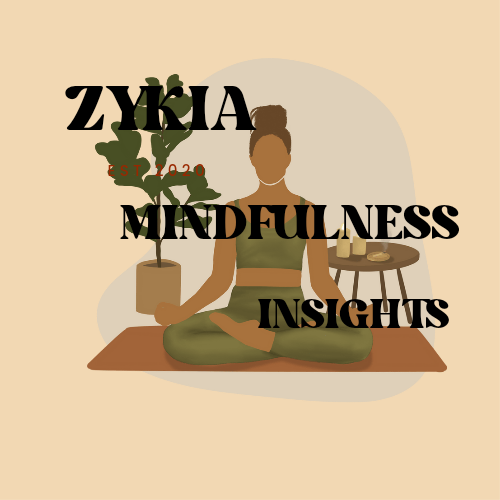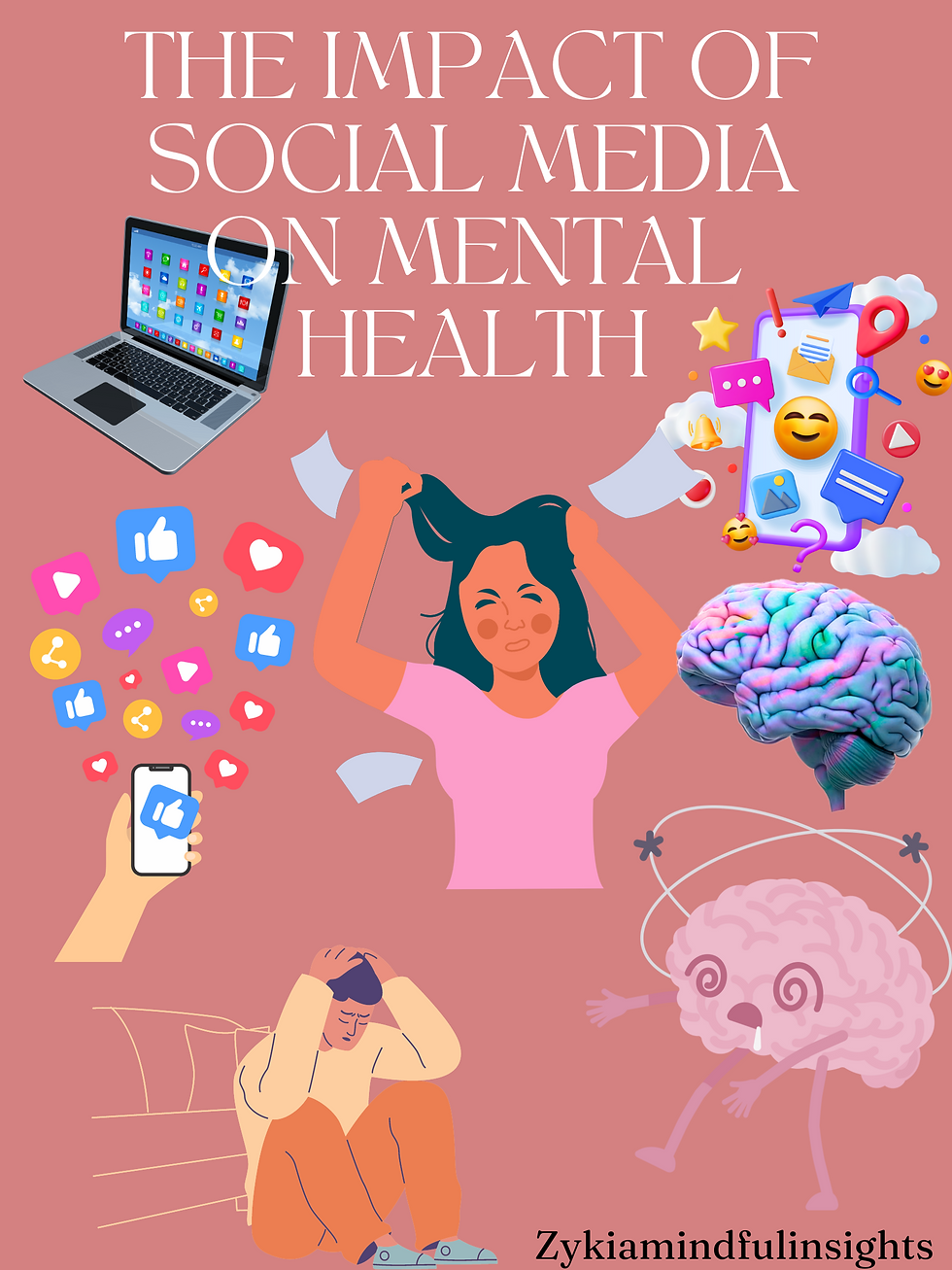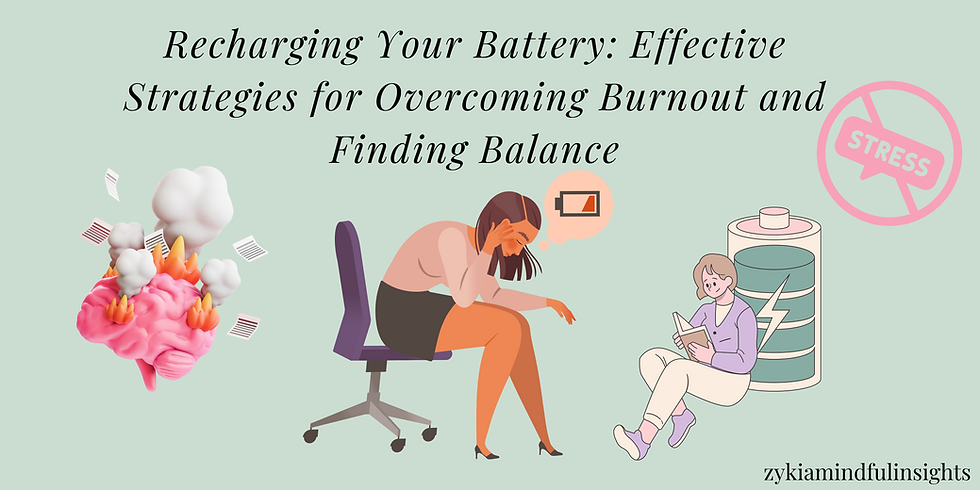The Impact of Social Media on Mental Health
- Zykia Hannah

- Feb 8, 2024
- 7 min read
The impact of social media on mental health is complex and multifaceted. While it can provide opportunities for connection and support, excessive use or negative interactions can contribute to feelings of anxiety, depression, and loneliness. Factors like comparison, cyberbullying, and the curated nature of content can exacerbate these effects. However, it's important to note that individual experiences vary, and some people may find positive benefits from their social media use.

Social media's pervasive presence in modern life brings both opportunities and challenges for mental well-being, as it shapes how individuals connect, communicate, and perceive themselves and others. Understanding its impact on mental health requires a nuanced examination of various factors, ranging from the benefits of social support to the risks of comparison and cyberbullying.
Before we begin to read today's post I will provide a few facts and tips regrading the impact of social media on mental health :
Facts :
Comparison : Studies have shown that frequent exposure to highly curated and idealized images on social media platforms can lead to increased feelings of inadequacy and lower self-esteem as individuals compare themselves to others.
Cyberbullying : Social media provides a platform for cyberbullying, which can have severe consequences on mental health, including increased levels of anxiety, depression, and suicidal ideation among victims.
Fear of Missing Out (FOMO) : The constant stream of updates and posts on social media can contribute to a fear of missing out, leading to feelings of anxiety and stress among individuals who feel pressured to constantly stay connected and enganged.
Tips :
Limit Screen Time : Set boundaries for your social media usage to avoid overexposure. Designate specific times during the day to check your accounts and consider using apps or features that limit your screen time.
Curate Your Feed : Unfollow accounts that make you feel inadequate or trigger negative emotions. Instead, follow accounts that inspire and uplift you, promoting a more positive online experience.
Take Breaks : Regularly take breaks from social media to disconnect and focus on real-life interactions and activities. Use this time to engage in hobbies, exercise, or spend quality time with loved ones.
Seek Support : If you experience cyberbullying or negative effects from social media, don't hesitate to reach out to friends, family, or mental health professional for support. Remember that you're not alone, and there are resources available to help you cope with the challenges of social media.
Practice Self-Compassion : Be kind to yourself and recognize that the highlight reels you see on social media don't always reflect reality. Focus on your own strengths and accomplishments, and avoid comparing yourself to others.
Social media's pervasive influence on daily life has brought about both positive and negative effects on mental health. On one hand, it provides a platform for connecting with friends and family, accessing information, and finding support communities, which can enhance feelings of belonging and social support. However, the constant exposure to carefully curated images and updates can fuel feelings of inadequacy and self-comparison, leading to decreased self-esteem and increased anxiety or depression among users.
Moreover, the phenomenon of "FOMO" (fear of missing out) exacerbates the pressure to constantly stay connected and engaged with social media, contributing to heightened levels of stress and feelings of isolation when users perceive themselves as being left out or not living up to the experiences portrayed online. Additionally, cyberbullying has become a significant concern, as social media provides a platform for anonymous harassment and online abuse, which can have devastating consequences on mental well-being, particularly among vulnerable populations such as adolescents.
The impact of social media on mental health is also influenced by individual factors such as personality traits, coping mechanisms, and offline social support networks. Some individuals may be more resilient to the negative effects of social media, while others may be more susceptible to its harmful consequences. Therefore, it's essential to recognize the diverse ways in which social media can impact mental health and tailor interventions and support strategies accordingly.
To mitigate the negative impact of social media on mental health, individuals can implement strategies such as setting boundaries on their social media usage, curating their online feeds to prioritize positive content, and taking regular breaks to disconnect and engage in offline activities. Seeking support from family, friends, or mental health professionals is also crucial for addressing any negative effects and developing healthy coping mechanisms to navigate the digital landscape responsibly. Ultimately, fostering awareness, resilience, and healthy digital habits are essential for promoting mental health outcomes in the age of social media.
"Social media is a powerful tool that can uplift and connect us, but its impact on mental health underscores the importance of using it mindfully and with intention."

Coping with negative comments online can be challenging, but there are several strategies you can use to navigate and manage them effectively :
Don't Take it Personally : Remember that negative comments often say more about the person making them than they do about you. Try not to internalize the criticism and remind yourself that everyone is entitled to their opinions, even if they're hurtful.
Take a break : If negative comments are starting to affect your mental well-being, it's okay to take a step back from social media or the platform where the comments are occurring. Give yourself time to process your emotions and focus on activities that bring you joy and fulfillment offline.
Focus on the Positive : Counteract negative comments by seeking out positive feedback and support from family, friends, and followers. Remind yourself of your strengths, accomplishments, and the value you bring to others, both online and offline.
Engage Constructively : If you choose to respond to negative comments, do thoughtfully and constructively. Avoid getting into heated arguments or engaging in personal attacks. Instead, calmly address any misinformation or misunderstandings and try to foster respectful dialogue.
Use Blocking and Reporting Features : Most social media platforms have features that allow you to block or report users who are engaging in harassment or abusive behavior. Don't hesitate to use these tools to protect yourself and maintain a safe online environment.
Seek support : Reach out to trusted family members, friends, or online communities for support and validation. Talking about your experiences with others who understand can help alleviate feelings of isolation and empower you to cope with negative comments more effectively.
Practice Self-Care : Prioritize self-care activities that promote mental and emotional well-being, such as meditation, exercise, journaling, ore spending time with loved ones. Taking care of yourself holistically can build resilience and help you navigate negative online interaction with greater ease.
Coping with negative comments online can be challenging, but there are effective strategies to navigate these situations. Firstly, it's essential to maintain perspective and remind yourself that negative comments often reflect more about the commenter's often reflect more about the commenters's mindset than your worth. Practicing self-compassion and understanding that everyone encounters criticism can help buffer the impact of hurtful remarks. Additionally, consider limiting your exposure to negative comments by taking breaks from social media or avoiding platforms where negativity is prevalent. Prioritize activities and interactions that uplift and inspire you, fostering a positive digital environment that supports your mental well-being.
Furthermore, developing resilience and healthy coping mechanisms is crucial for dealing with negative comments online. Instead of engaging in heated arguments or dwelling on hurtful remarks, focus on constructive responses or simply ignore the negativity altogether. Surround yourself with supportive family, friends, or online communities who can provide encouragement and validation during challenging times. Remember that your worth is not determined by the opinions of others, and prioritizing your mental health means prioritizing self-care and positive connections both online and offline.

Here are 4 ways you can stay away from social media to protect you mental health :
Set Specific Boundaries : Establish designated times during the day when you will completely refrain from using social media. This could be during work hours, before bedtime, or during social gatherings to prioritize real-life interactions.
Use Technology Tools : Utilize apps or features on your devices that limit your access to social media. Set timers or use website blockers to restrict your usage during certain periods, helping you to stay focused on other activities and reduce temptation.
Find Alternative Activities : Replace social media time with activities that promote mental well-being, such as exercising, reading, practicing mindfulness, or pursuing hobbies. Engaging in offline activities can provide a sense of fulfillment and reduce reliance on social media for entertainment or validation.
Create a Supportive Environment : Surround yourself with supportive friends, family members, or peers who understand your goals and encourage your efforts to stay away from social media. Communicate your intentions to limit social media usage and enlist their support in holding yourself accountable.
Now let's talk about some privacy and online safety about social media. Privacy and online safety considerations are crucial when discussing the impact of social media on mental health. Here are some key points to consider :
Protecting Personal Information : Encourage users to review and adjust their privacy settings on social media platforms to control who can see their posts, photos, and personal information. Limiting the amount of personal data shared online can reduce the risk of identity theft, cyberstalking, and other privacy violations that can contribute to stress and anxiety.
Avoiding Oversharing : Remind individuals to be mindful of the information they share online, as oversharing can compromise their privacy and expose them to potential risks. Encourage them to think twice before posting sensitive or intimate details about their personal lives, relationships, or mental health struggles, as this information can be exploited by malicious actors or used against them in harmful ways.
Recognizing Online Threats :Educate users about common online threats, such as phishing scams, malware attacks, and social engineering tactics used by cybercriminals to manipulate and exploit individuals. Provide tips for recognizing and avoiding suspicious links, requests for personal information, and other red flags that may indicate a security threat.
Building Digital Literacy : Empower individuals to become more digitally literate and savvy consumers of online content by teaching them how to critically evaluate information, identify misinformation and fake news, and discern credible sources of information. Strengthening digital literacy skills can help individuals navigate social media more safely and confidently, reducing the likelihood of falling victim to online scams or manipulation.
Setting Healthy Boundaries : Encourage users to establish clear boundaries around their social media usage and online interactions to protect their mental health usage and online interactions. to protect their mental health and well-being. This may include limiting the amount of time spent on social media, taking regular breaks from screens, and prioritizing face-to-face interactions and offline activities that promote mental wellness. By setting boundaries and practicing self-care, individuals can reduce the negative impact of social media on their mental health and maintain a healthier balance between their online and offline lives.
In conclusion, while social media offers unprecedented connectivity and opportunities for expression, its impact on mental health is profound and multifaceted. Acknowledging the potential risks and implementing strategies to mitigate them is essential for fostering a healthier relationship with social media. By promoting awareness, practicing self-care, and seeking support when needed, individuals can navigate the digital landscape more responsibly and prioritize their mental well-being in the age of social media.
You have made it to the end of today's blog post. I hope you have gained and learned some new information. I hope this is very helpful for someone that might need this. Also feel free to comment, leave some feedback, and like the post. Thank you!
🫧Quote of the day :
"Social media can be a never-ending cycle of struggles if you allow what others think and say about you to affect the way you feel about yourself."




People need to remember that all of social media is just someone’s two cents!
Truth!!!